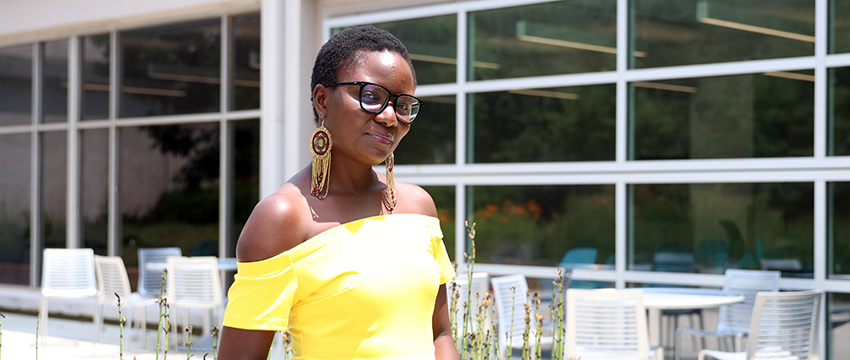Wunpini Fatimata Mohammed receives accolades at annual AEJMC conference

Wunpini Fatimata Mohammed receives accolades at annual AEJMC conference
Wunpini Fatimata Mohammed, assistant professor in Entertainment and Media Studies, is receiving two awards for her paper, “Decolonizing Methodologies in Media Studies,” at the 2021 Association for Education in Journalism and Mass Communication conference.
Additionally, Mohammed has been selected as a 2021 Kopenhaver Fellow, a program helping female faculty members through mentoring, networking and preparing for tenure and promotion.
Mohammed’s paper was inspired in part by her dissertation that she wrote while a doctoral student at the Pennsylvania State University. A native of Tamale, Ghana, Mohammed studied sociocultural contexts where she collects feedback from women about the impact of films they watch and the news they listen to.
“I want to understand the way these women engage films, including what drew them to want to watch them and what they thought society’s impression was of the films,” Mohammed explained. “I also wanted to see how their personal experiences and values shaped the films they watched and what they took away from those films.”
Mohammed is receiving first place in Faculty Paper Awards, also known as the Robert L. Stevenson Open Paper Competition, as well as the Best Paper Award for African Journalism Studies in the International Communication Division.
In addition to the topic of the paper, Mohammed works hard to ensure her data is authentic, which can be difficult when studying marginalized communities. She obtains her data through customizing focus groups that mirror typical conversations that women have with one another. The goal is to obtain transparent answers from the women away from the patriarchal influence of men in the community.
“I pulled from the local indigenous knowledge systems to guide my engagement of this community as a whole,” Mohammed said. “I looked at the way we engage with each other on a daily basis and the importance of human dignity and respect regardless of class, ethnicity and gender.”
Another recent paper by Mohammed, “Why we need intersectionality in Ghanaian feminist politics and discourses,” received an honorable mention in the 2021 Stuart Hall Award at the International Association for Media and Communication Research conference earlier this summer. This paper mapped the evolution of feminist discourses in Ghana, paying attention to the gaps in feminist theory and practice.